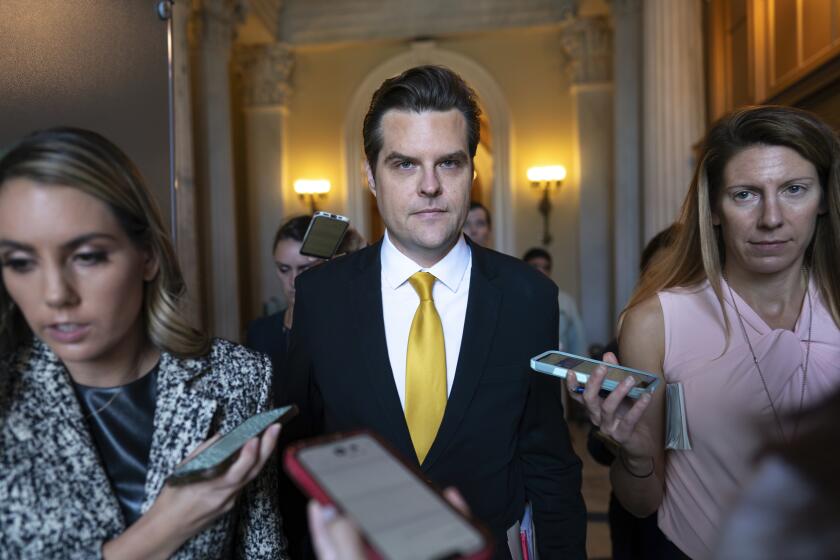Californiaâs water bond that wasnât
So much for the Safe, Clean and Reliable Drinking Water Supply Act of 2012. Earlier this month, lawmakers pulled the $11-billion bond measure off the Nov. 6 ballot because the time wasnât right, which is another way of saying there was no way voters were going to approve a multibillion-dollar bond this year, and in the course of defeating it they were more likely to prowl for other tax or spending measures to reject, like the temporary sales and income tax increases on which Gov. Jerry Brown and Democrats in the Legislature are counting to make this yearâs budget work.
If the bond sounded familiar, itâs because you may remember it as the Safe, Clean and Reliable Drinking Water Supply Act of 2010. The time wasnât right two years ago either, and after leading a painstaking effort to negotiate among numerous parties and interests to reach a carefully balanced water deal, then-Gov. Arnold Schwarzenegger realized there was no way voters were going to approve a bond in the midst of the mortgage and budget meltdowns.
At the time the 2010 version got bounced from the ballot, The Times had not yet weighed in on the measure, also known as Proposition 18. Parts of the bond raised serious concern. The price tag was steep, especially in a state that has borrowed so much and pushed the boundaries of sound bonding policy. Why $11 billion? In part because it was fat with earmarks.
ENDORSEMENTS: November 6 election
Still, it was disappointing to not be able to finally assess the measure and allow voters to accept or reject it, because it was the result of a concord brokered a year earlier among environmentalists, agribusiness factions, the Bay Area, Southern California and others, not exactly to break the stateâs three-decade deadlock over water but to at least agree on a new framework that might allow us to move forward. The bond was integral to a deal that included the âco-equal goalsâ of preserving a reliable water supply and repairing the ecosystem of the Sacramento-San Joaquin River Delta. The bond, or at least the agreement that undergirded it, could have provided a measure of good faith and momentum to the rest of the process. As it is, with the bond dropped in 2010 â and now dropped again â it must work the other way around if it is to work at all. The rest of the process may have to provide momentum for a bond two years from now.
The bond would not pay for the likely centerpiece of the water deal â a controversial tunnel to bring Sacramento River water around the delta and south to the California Aqueduct. If there is to be such a âconveyance,â or peripheral canal/tunnel/whatever, it would be paid for by the projectâs users, who would pass along costs that ultimately would take the form of higher rates for farmers and residents who get the transported delta water. The bond, by contrast, would be paid for from the stateâs general fund and thus by all Californians whether they use delta water or not, and would be used for things meant to benefit the entire state.
But thereâs the rub. Would cleaning up Southern Californiaâs aquifers, so the cities here could rely more on groundwater and less on delta and Colorado River water, benefit the whole state? What about programs to enhance recycling and conservation efforts? Good arguments could be made that it could, but how do we justify $135 million for educational and interpretive programs?
There are two answers, and neither is completely satisfying. First, as Schwarzenegger said when he signed the bill to put the bond on the ballot, âwhat is for some people pork is for us cleaning up the groundwater.â Or, he could as easily have said, cleaning up the mess left by private water companies in cities such as Maywood, where the tap water on any given day could be brown, green or yellow, and equally nonpotable. Or shoring up delta levees. And second, pork is sometimes necessary to achieve political buy-in. Itâs a disgusting fact of life, but a fact of life nonetheless.
The bond can, and should, be pared down considerably before it reemerges as the Safe, Clean and Reliable Drinking Water Supply Act of 2014. But it will require a great deal of wisdom and dexterity to rebroker a deal that deletes the pork and still keeps the necessary political consensus intact.
More to Read
A cure for the common opinion
Get thought-provoking perspectives with our weekly newsletter.
You may occasionally receive promotional content from the Los Angeles Times.










